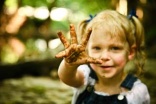Home › magazine › latest news › Dirty hands help to guard children from allergies
Dirty hands help to guard children from allergies
20th of July 2016Dirty habits involving grubby fingers could be good for you, according to a new report.
Researchers in New Zealand have discovered that children who suck their thumbs or bite their nails are less likely to develop allergic sensitivities than other youngsters. And children with both "bad habits" are even less likely to be allergic to house dust mites, grass, cats, dogs, horses or airborne fungi.
The Dunedin Multidisciplinary Study followed the progress of 1,037 participants from birth to adulthood. Around a third of the children - all born between 1972-1973 - were thumb-suckers or nail-biters. A total of 45 per cent of the children in the study displayed signs of allergies at age 13. However, this figure fell to 40 per cent among the children who either sucked their thumbs or bit their nails. And just 31 per cent of the children who had both habits showed signs of allergies.
This trend was sustained into adulthood with factors such as pet ownership, exposure to house dust mites and parents who smoked seemingly having no effect on the results.
Researchers were testing the idea that common childhood habits increased microbial exposures, affecting the immune system and reducing the development of allergic reactions.
"Our findings are consistent with the hygiene theory that early exposure to dirt or germs reduces the risk of developing allergies," said professor Malcolm Sears who assisted in the study. "While we don't recommend that these habits should be encouraged, there does appear to be a positive side."
The research was carried out by researchers of New Zealand's Dunedin School of Medicine.










